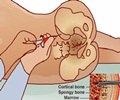With German doctors curing an AIDS patient using bone marrow transplant, American researchers have been encouraged to explore stem cell approaches to treat the disease.
"The case in Germany was a natural gene-therapy experiment," said Gerhard Bauer, a UC Davis stem cell researcher."We are working on a similar approach to genetically engineer a patient's own stem cells in a way that mimics this natural immunity. The German case offers further proof that genetic engineering provides a pathway to success, and gene therapy offers real hope as a cure for AIDS," he added.
He and his colleagues have developed a mouse model that allows pre-clinical testing of their new gene-therapy protocol, which they hope will pave the way for human clinical trials within five years.
The researchers will present the preliminary results of their latest research at the 50th annual meeting of the American Society for Hematology in San Francisco on Sunday.
German doctors announced last month that they had cured a 42-year-old of AIDS. The patient, an American living in Berlin, also had leukemia, which is best treated by a bone marrow transplant.
The doctors gave him a bone marrow transplant from a person with natural immunity to HIV, believing that it might cure the man of both diseases. Since the transplant, the patient is said to have lived for 20 months without any detectable traces of HIV.
Advertisement
"If we can replace normal immune cells with HIV-resistant ones, we can cure AIDS," Bauer said.
Advertisement
The researcher further said that such engineered IPS cells could then be differentiated into bone marrow stem cells, and introduced into the patient using a procedure similar to a bone marrow transplant.
"The hope is that one day we will use a patient's own skin cells to develop the engineered IPS cells to avoid possible rejection. As in the German case, the end result would be an immune system that produces HIV-resistant immune cells," said Bauer, who worked on clinical HIV gene therapy trials at Childrens Hospital Los Angeles before coming to UC Davis.
The researchers have revealed that, according to their theory, the experimental treatment would result in an immune system that remains functional, even in the face of an HIV infection, but would halt or slow the progression toward AIDS.
"The anti-HIV genes take advantage of how HIV works. The virus targets cells that are descendants of hemopoeitic stem cells," said Anderson, who is now writing a paper about the investigation
Bauer and Anderson are hoping to demonstrate in their mouse model that HIV-infection cannot occur following their gene therapy treatment, providing the needed confidence in safety before embarking on clinical trials. They believe that studies on the clinical use of IPS cells may lead to a cure for AIDS.
"A real cure will come when we can replace all the hematopoietic stem cells with HIV resistant stem cells. What is so exciting is that we're clearly on the path of doing just that," said Bauer.
Source-ANI
SRM















